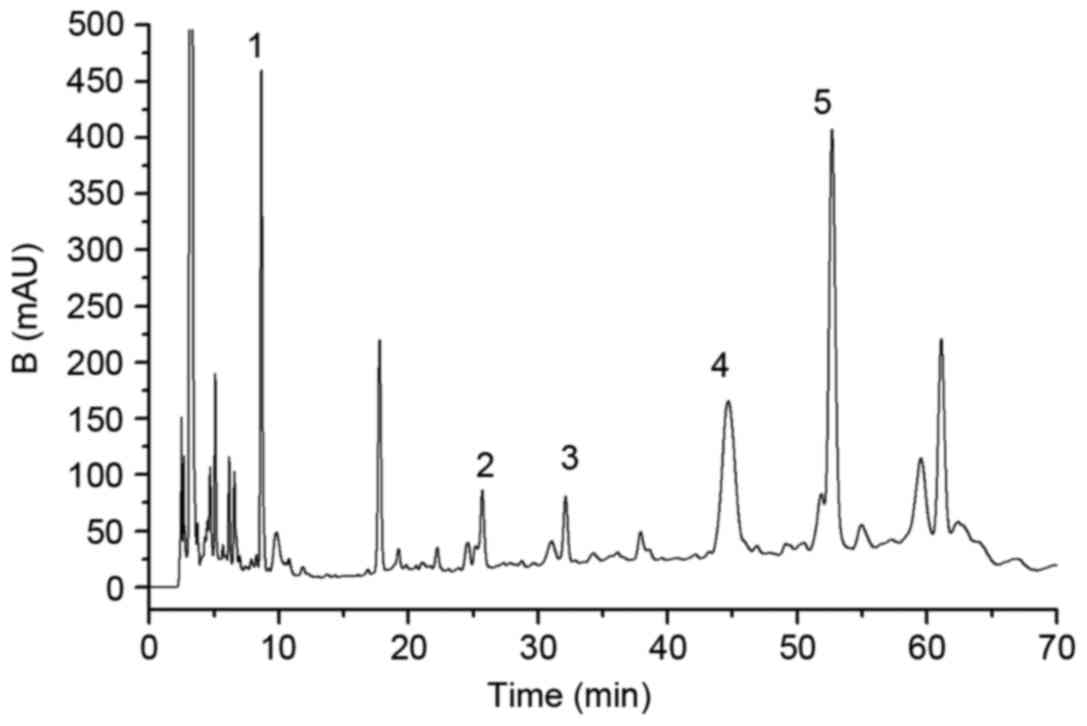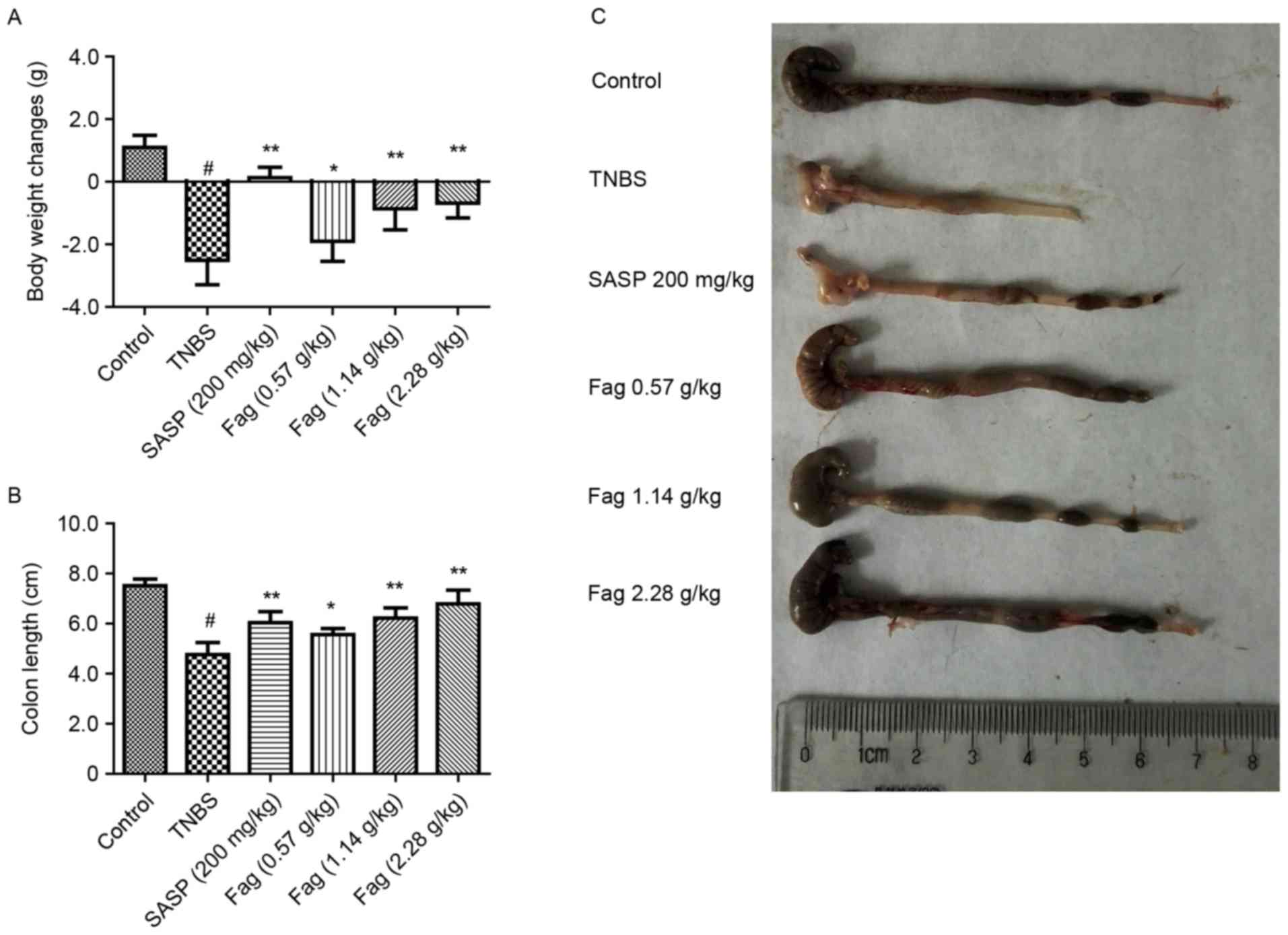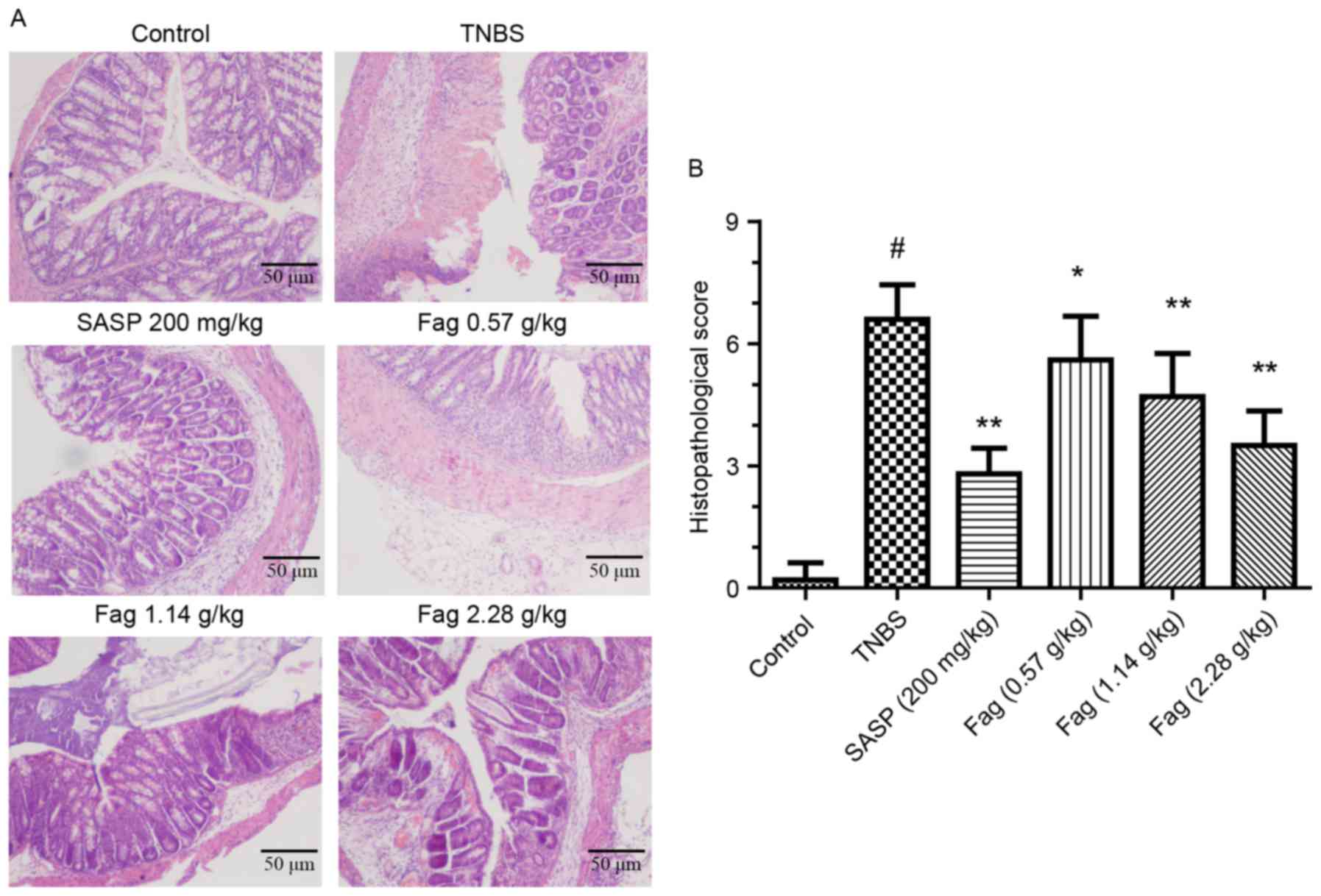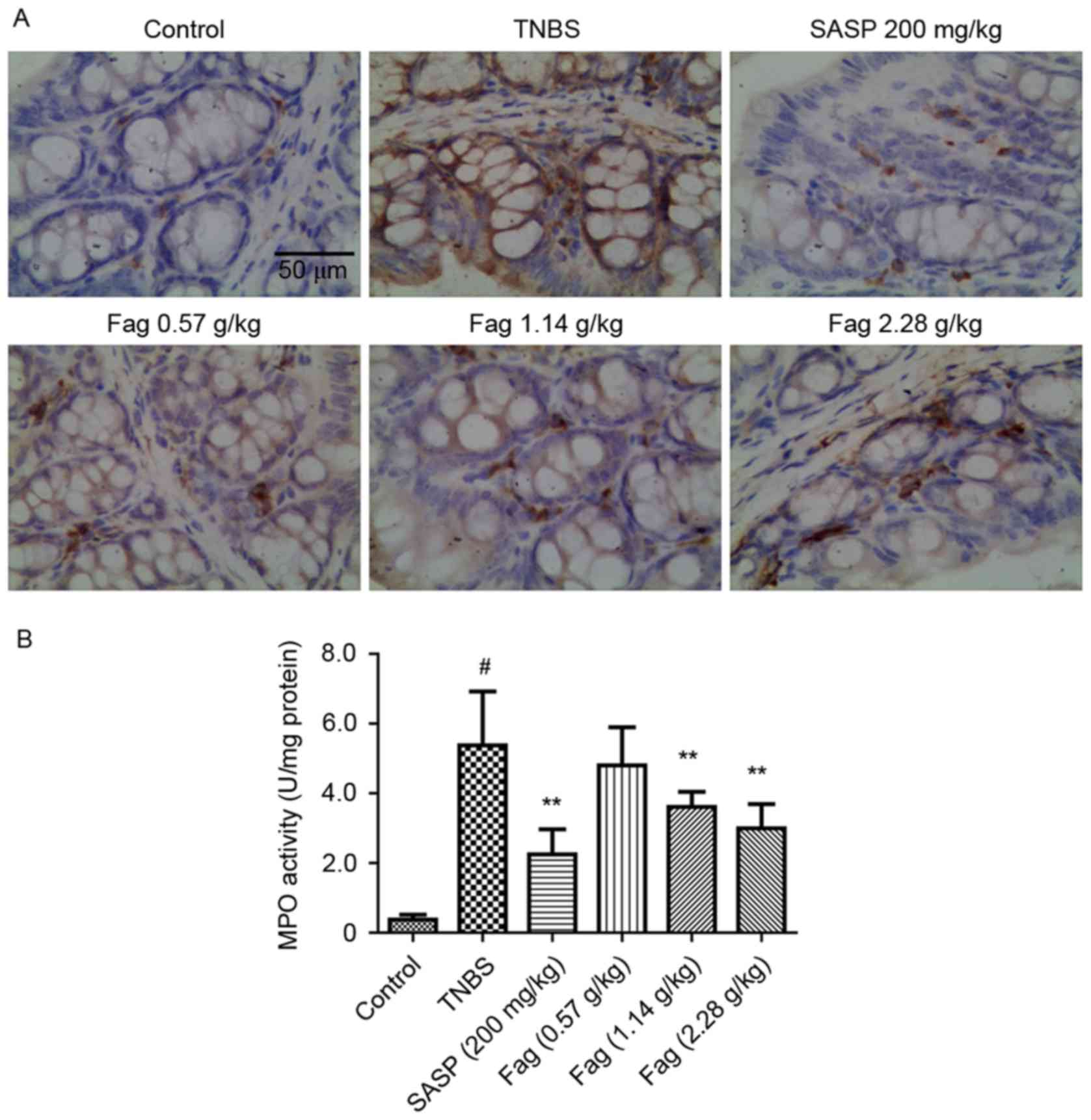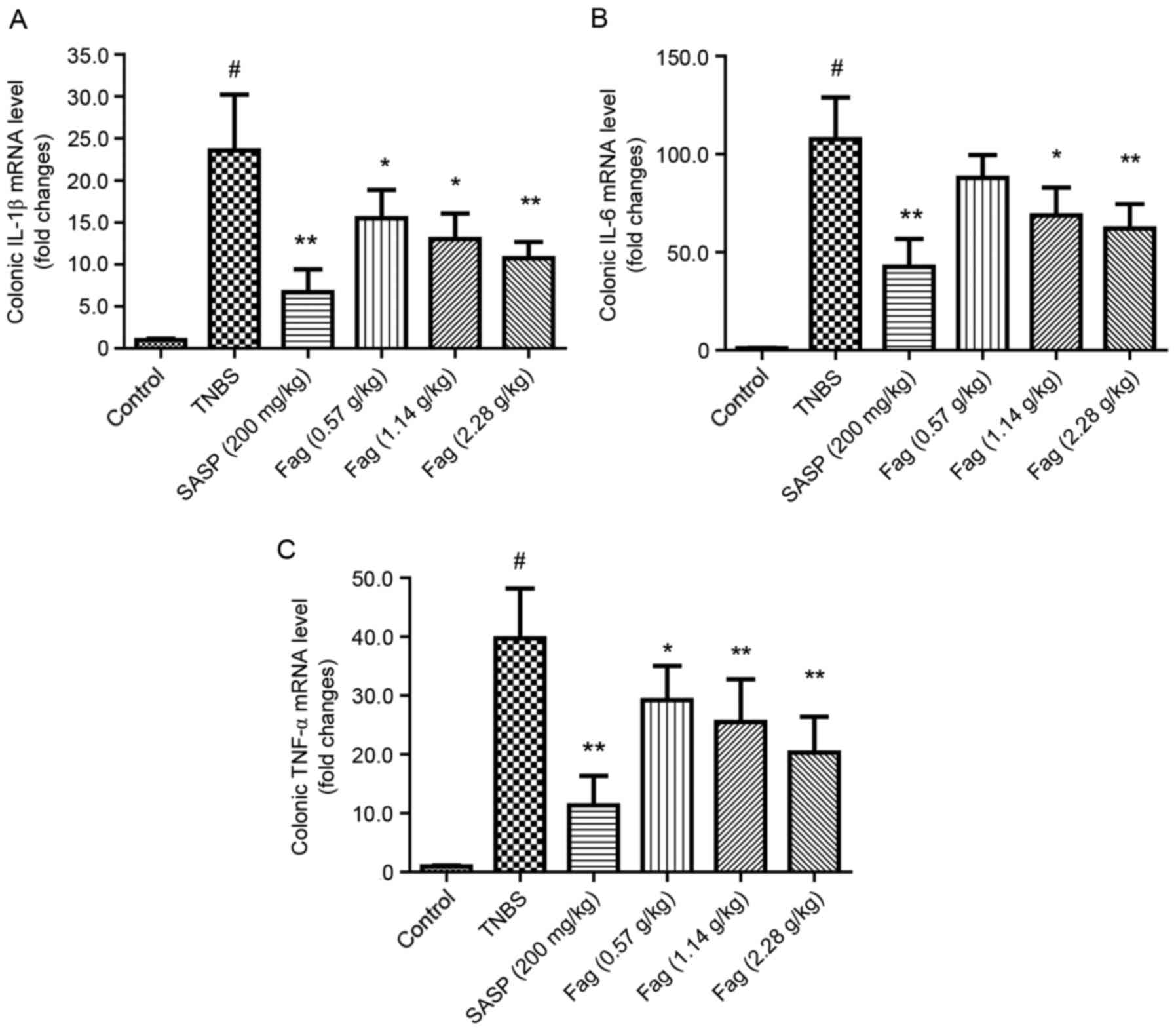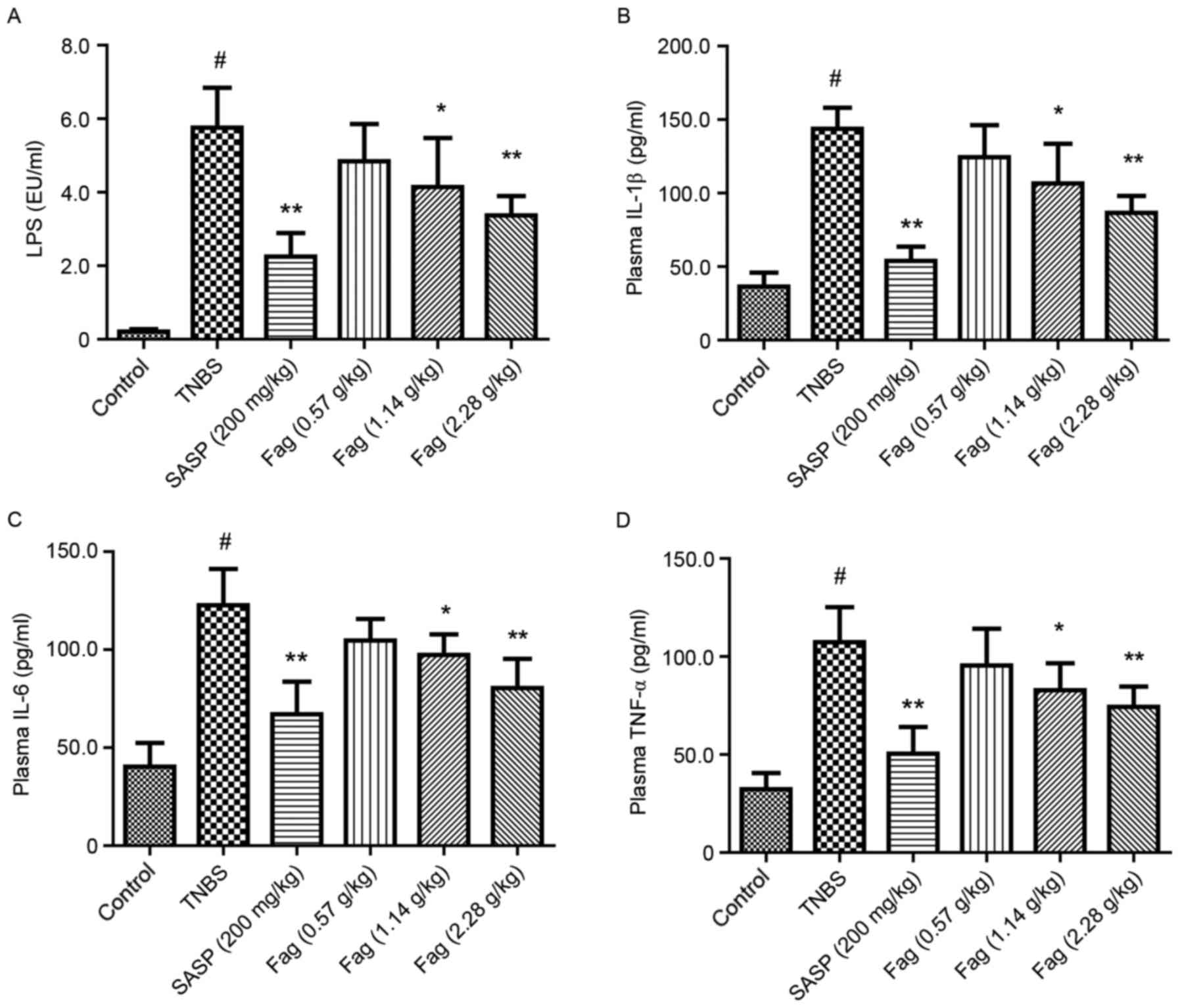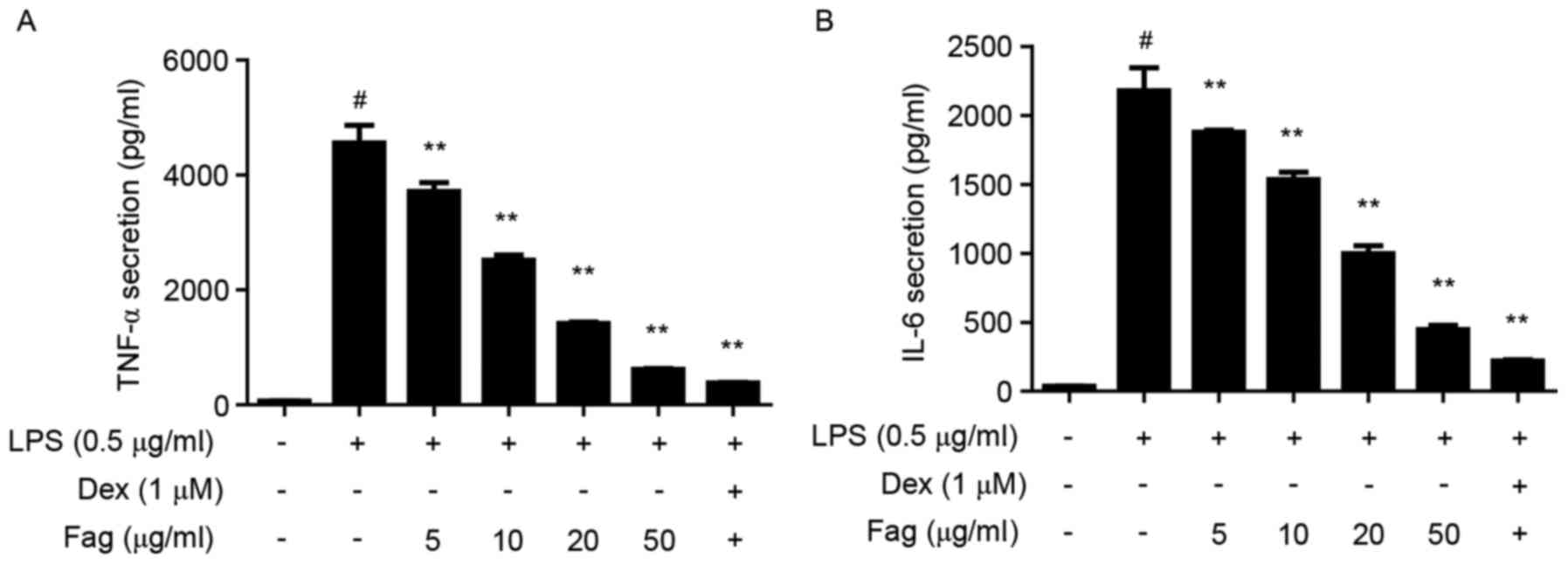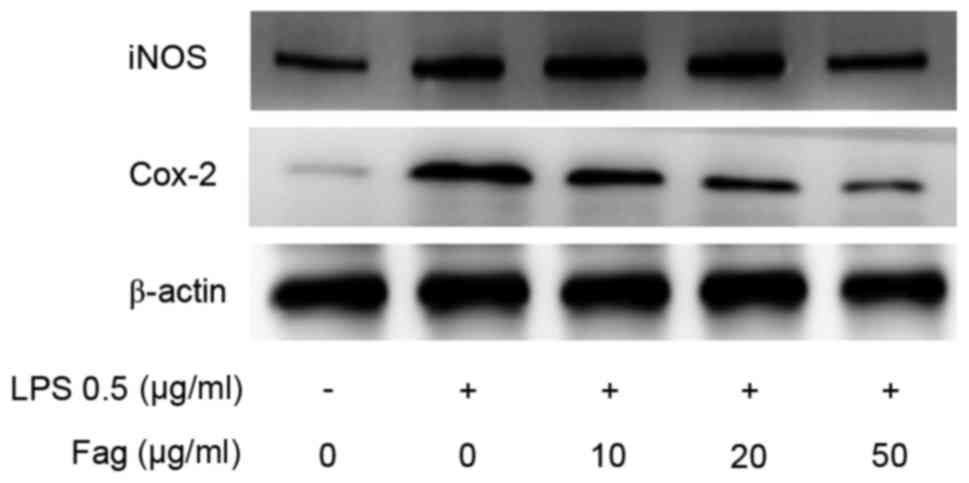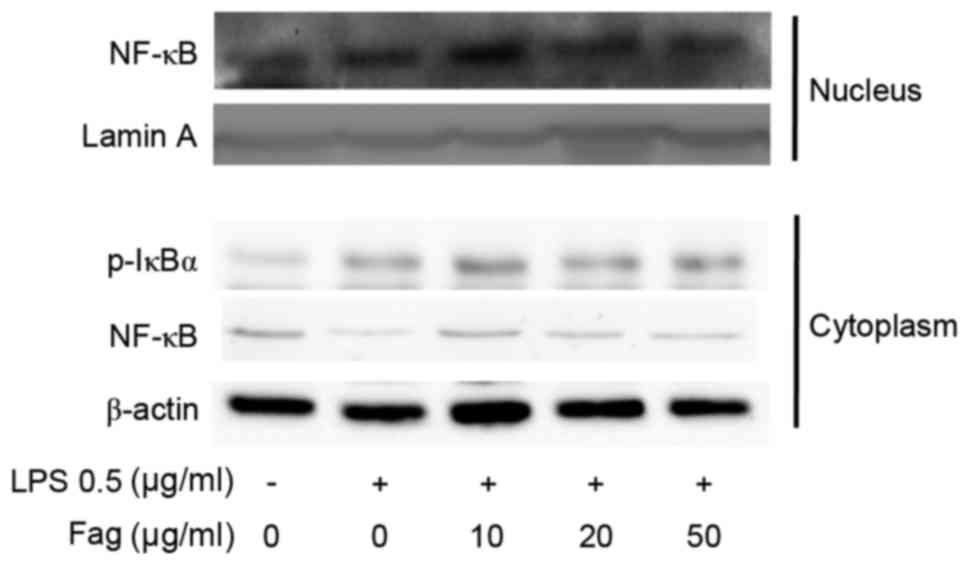|
1
|
Lutgens M, Oijen M, van Mooiweer E, van
der Valk M, Vleggaar F, Siersema P and Oldenburg B: A
risk-profiling approach for surveillance of inflammatory bowel
disease-colorectal carcinoma is more cost-effective: A comparative
cost-effectiveness analysis between international guidelines.
Gastrointest Endosc. 80:842–848. 2014. View Article : Google Scholar : PubMed/NCBI
|
|
2
|
Rubin DT: Why it's time for updated U.S.
colorectal cancer prevention guidelines in inflammatory bowel
disease. Gastrointest Endosc. 80:849–851. 2014. View Article : Google Scholar : PubMed/NCBI
|
|
3
|
Huttenhower C, Kostic AD and Xavier RJ:
Inflammatory bowel disease as a model for translating the
microbiome. Immunity. 40:843–854. 2014. View Article : Google Scholar : PubMed/NCBI
|
|
4
|
Tsai SY, Yang TY, Lin CL, Tsai YH, Kuo CF
and Kao CH: Increased risk of varicella zoster virus infection in
inflammatory bowel disease in an Asian population: A nationwide
population-based cohort study. Int J Clin Pract. 69:228–234. 2015.
View Article : Google Scholar : PubMed/NCBI
|
|
5
|
Paul S, Wand M, Emerick GT and Richter JM:
The role of latanoprost in an inflammatory bowel disease flare.
Gastroenterol Rep (Oxf). 2:232–234. 2014. View Article : Google Scholar : PubMed/NCBI
|
|
6
|
Deepak P and Stobaugh DJ: Maternal and
foetal adverse events with tumour necrosis factor-alpha inhibitors
in inflammatory bowel disease. Aliment Pharm Therap. 40:1035–1043.
2014. View Article : Google Scholar
|
|
7
|
Ghouri YA, Richards DM, Rahimi EF, Krill
JT, Jelinek KA and DuPont AW: Systematic review of randomized
controlled trials of probiotics, prebiotics and synbiotics in
inflammatory bowel disease. Clin Exp Gastroenterol. 7:473–487.
2014.PubMed/NCBI
|
|
8
|
Kang A, Zhang S, Shan J and Di L: Gut
microbiota-mediated deglycosylation of ginsenoside Rb-1 in rats: In
vitro and in vivo insights from quantitative ultra-performance
liquid chromatography-mass spectrometry analysis. Anal Methods.
7:6173–6181. 2015. View Article : Google Scholar
|
|
9
|
Heilmann RM, Otoni CC, Jergens AE,
Grutzner N, Suchodolski JS and Steiner JM: Systemic levels of the
anti-inflammatory decoy receptor soluble RAGE (receptor for
advanced glycation end products) are decreased in dogs with
inflammatory bowel disease. Vet Immunol Immunopathol. 161:184–192.
2014. View Article : Google Scholar : PubMed/NCBI
|
|
10
|
Shouval DS, Ebens CL, Murchie R, McCann K,
Rabah R, Klein C, Muise A and Snapper SB: Large b-cell lymphoma in
an adolescent patient with IL-10 receptor deficiency and history of
infantile inflammatory bowel disease. J Pediatr Gastroenterol Nutr.
63:e15–e17. 2016. View Article : Google Scholar : PubMed/NCBI
|
|
11
|
Hyams JS: Standardized recording of
parameters related to the natural history of inflammatory bowel
disease: From Montreal to Paris. Dig Dis. 32:337–344. 2014.
View Article : Google Scholar : PubMed/NCBI
|
|
12
|
Zhang Y, Wang Y, Zhang F, Wang K, Liu G,
Yang M, Luan Y, Zhao Z, Zhang J, Cao X and Zhang D: Allyl methyl
disulfide inhibits IL-8 and IP-10 secretion in intestinal
epithelial cells via the NF-кB signaling pathway. Int
Immunopharmacol. 27:156–163. 2015. View Article : Google Scholar : PubMed/NCBI
|
|
13
|
Nishitani Y, Yamamoto K, Yoshida M, Azuma
T, Kanazawa K, Hashimoto T and Mizuno M: Intestinal
anti-inflammatory activity of luteolin: Role of the aglycone in
NF-κB inactivation in macrophages co-cultured with intestinal
epithelial cells. Biofactors. 39:522–533. 2013. View Article : Google Scholar : PubMed/NCBI
|
|
14
|
Liu J, Zhou F, Chen Q, Kang A, Lu M, Liu
W, Zang X, Wang G and Zhang J: Chronic inflammation up-regulates
P-gp in peripheral mononuclear blood cells via the STAT3/Nf-κb
pathway in 2,4,6-trinitrobenzene sulfonic acid-induced colitis
mice. Sci Rep. 5:135582015. View Article : Google Scholar : PubMed/NCBI
|
|
15
|
Freeman JJ, Rabah R, Hirschl RB, Maspons
A, Meier D and Teitelbaum DH: Anti-TNF-α treatment for
post-anastomotic ulcers and inflammatory bowel disease with
Crohn's-like pathologic changes following intestinal surgery in
pediatric patients. Pediatr Surg Int. 31:77–82. 2015. View Article : Google Scholar : PubMed/NCBI
|
|
16
|
Loftus EJ: Biologic therapy in
inflammatory bowel disease. Gastroenterol Clin North Am.
43:xv–xvii. 2014. View Article : Google Scholar : PubMed/NCBI
|
|
17
|
Dave M, Papadakis KA and Faubion WA Jr:
Immunology of inflammatory bowel disease and molecular targets for
biologics. Gastroenterol Clin North Am. 43:405–424. 2014.
View Article : Google Scholar : PubMed/NCBI
|
|
18
|
Maranville JC, Micic D, Hanauer SB, Rienzo
AD and Kupfer SS: In vitro sensitivity assays and clinical response
to glucocorticoids in patients with inflammatory bowel disease. J
Crohns Colitis. 8:1539–1547. 2014. View Article : Google Scholar : PubMed/NCBI
|
|
19
|
Bishop JB, Witt KL, Gulati DK and
MacGregor JT: Evaluation of the mutagenicity of the
anti-inflammatory drug salicylazosulfapyridine (SASP). Mutagenesis.
5:549–554. 1990. View Article : Google Scholar : PubMed/NCBI
|
|
20
|
Tian L, Xu L and Yang S: Chemical
composition of Fagopyrum cymosum (Trev.) Meisn. Zhongguo
Zhong Yao Za Zhi. 22:743–765. 1997.(In Chinese). PubMed/NCBI
|
|
21
|
Dong LY, Wang CY, Wu CQ, Jiang Q and Zhang
ZF: Protection and mechanism of Fagopyrum cymosum on lung
injury in rats with Klebsiella pneumonia. Zhong Yao Cai.
35:603–607. 2012.(In Chinese). PubMed/NCBI
|
|
22
|
Chan PK: Inhibition of tumor growth in
vitro by the extract of Fagopyrum cymosum (fago-c). Life
Sci. 72:1851–1858. 2003. View Article : Google Scholar : PubMed/NCBI
|
|
23
|
Shen L, Wang P, Guo J and Du G:
Anti-arthritic activity of ethanol extract of Fagopyrum
cymosum with adjuvant-induced arthritis in rats. Pharm Biol.
51:783–789. 2013. View Article : Google Scholar : PubMed/NCBI
|
|
24
|
Liu LN, Yan J and Sun ZG: Effect of
Fagopyrum cymosum (Trev.) Meisn alcohol extract on
defecation and isolated colon of diarrhea-IBS rats and its
mechanism. Zhongguo Zhong Xi Yi Jie He Za Zhi. 34:1469–1475.
2014.(In Chinese). PubMed/NCBI
|
|
25
|
Liu L, Cai X, Yan J, Luo Y, Shao M, Lu Y,
Sun Z and Cao P: In Vivo and In Vitro Antinociceptive effect of
Fagopyrum cymosum (Trev.) Meisn extracts: A possible action
by recovering intestinal barrier dysfunction. Evid Based Complement
Alternat Med. 2012:9838012012. View Article : Google Scholar : PubMed/NCBI
|
|
26
|
Shao M, Yang YH, Gao HY, Wu B, Wang LB and
Wu LJ: Phenolic acid derivatives from the rhizome of Fagopyrum
cymosum. Zhongguo Zhong Yao Za Zhi. 30:1591–1593. 2005.(In
Chinese). PubMed/NCBI
|
|
27
|
Witaicenis A, Luchini AC, Hiruma-Lima CA,
Felisbino SL, Garrido-Mesa N, Utrilla P, Gálvez J and Di Stasi LC:
Suppression of TNBS-induced colitis in rats by 4-methylesculetin, a
natural coumarin: Comparison with prednisolone and sulphasalazine.
Chem Biol Interact. 195:76–85. 2012. View Article : Google Scholar : PubMed/NCBI
|
|
28
|
Cui L, Feng L, Zhang ZH and Jia XB: The
anti-inflammation effect of baicalin on experimental colitis
through inhibiting TLR4/NF-κB pathway activation. Int
Immunopharmacol. 23:294–303. 2014. View Article : Google Scholar : PubMed/NCBI
|
|
29
|
Livak KJ and Schmittgen TD: Analysis of
relative gene expression data using real-time quantitative PCR and
the 2(-Delta Delta C(T)) method. Methods. 25:402–408. 2001.
View Article : Google Scholar : PubMed/NCBI
|
|
30
|
te Velde AA, Verstege MI and Hommes DW:
Critical appraisal of the current practice in murine TNBS-induced
colitis. Inflamm Bowel Dis. 12:995–999. 2006. View Article : Google Scholar : PubMed/NCBI
|
|
31
|
Pastor RO, Lopez SR, Albéniz AE, Martínez
AH, Sevillano ER and Martínez AA: Serum lipopolysaccharide-binding
protein in endotoxemic patients with inflammatory bowel disease.
Inflamm Bowel Dis. 13:269–277. 2007. View Article : Google Scholar : PubMed/NCBI
|
|
32
|
Guandalini S: Are probiotics or prebiotics
useful in pediatric irritable bowel syndrome or inflammatory bowel
disease? Front Med (Lausanne). 1:232014.PubMed/NCBI
|
|
33
|
Choi EY, Jin JY, Choi JI, Choi IS and Kim
SJ: Effects of luteolin on the release of nitric oxide and
interleukin-6 by macrophages stimulated with lipopolysaccharide
from Prevotella intermedia. J Periodontol. 82:1509–1517.
2011. View Article : Google Scholar : PubMed/NCBI
|
|
34
|
Yang CP, Huang GJ, Huang HC, Chen YC,
Chang CI, Wang SY, Chang HS, Tseng YH, Chien SC and Kuo YH: The
effect of the aerial part of Lindera akoensis on
lipopolysaccharides (LPS)-induced nitric oxide production in
RAW264.7 cells. Int J Mol Sci. 14:9168–9181. 2013. View Article : Google Scholar : PubMed/NCBI
|
|
35
|
Funakoshi T, Yamashita K, Ichikawa N,
Fukai M, Suzuki T, Goto R, Oura T, Kobayashi N, Katsurada T,
Ichihara S, et al: A novel NF-κB inhibitor,
dehydroxymethylepoxyquinomicin, ameliorates inflammatory colonic
injury in mice. J Crohns Colitis. 6:215–225. 2012. View Article : Google Scholar : PubMed/NCBI
|
|
36
|
Hardee S, Alper A, Pashankar DS and
Morotti RA: Histopathology of duodenal mucosal lesions in pediatric
patients with inflammatory bowel disease: Statistical analysis to
identify distinctive features. Pediatr Dev Pathol. 17:450–454.
2014. View Article : Google Scholar : PubMed/NCBI
|
|
37
|
Beniwal-Patel P and Saha S: The role of
integrin antagonists in the treatment of inflammatory bowel
disease. Expert Opin Biol Ther. 14:1815–1823. 2014. View Article : Google Scholar : PubMed/NCBI
|
|
38
|
Munakata S, Tashiro Y, Nishida C, Sato A,
Komiyama H, Shimazu H, Dhahri D, Salama Y, Eiamboonsert S, Takeda
K, et al: Inhibition of plasmin protects against colitis in mice by
suppressing matrix metalloproteinase 9-mediated cytokine release
from myeloid cells. Gastroenterology. 148:565–578. 2015. View Article : Google Scholar : PubMed/NCBI
|
|
39
|
Castro J, Ocampo Y and Franco L: Cape
gooseberry (Physalis peruviana L.) calyces ameliorate TNBS
acid-induced colitis in rats. J Crohns Colitis. 9:1004–1015. 2015.
View Article : Google Scholar : PubMed/NCBI
|
|
40
|
Fischer A, Gluth M, Weege F, Pape UF,
Wiedenmann B, Baumgart DC and Theuring F: Glucocorticoids regulate
barrier function and claudin expression in intestinal epithelial
cells via MKP-1. Am J Physiol Gastrointest Liver Physiol.
306:G218–G228. 2014. View Article : Google Scholar : PubMed/NCBI
|
|
41
|
Li X, Wang Q, Xu H, Tao L, Lu J, Cai L and
Wang C: Somatostatin regulates tight junction proteins expression
in colitis mice. Int J Clin Exp Pathol. 7:2153–2162.
2014.PubMed/NCBI
|
|
42
|
Hering NA and Schulzke JD: Therapeutic
options to modulate barrier defects in inflammatory bowel disease.
Dig Dis. 27:450–454. 2009. View Article : Google Scholar : PubMed/NCBI
|















